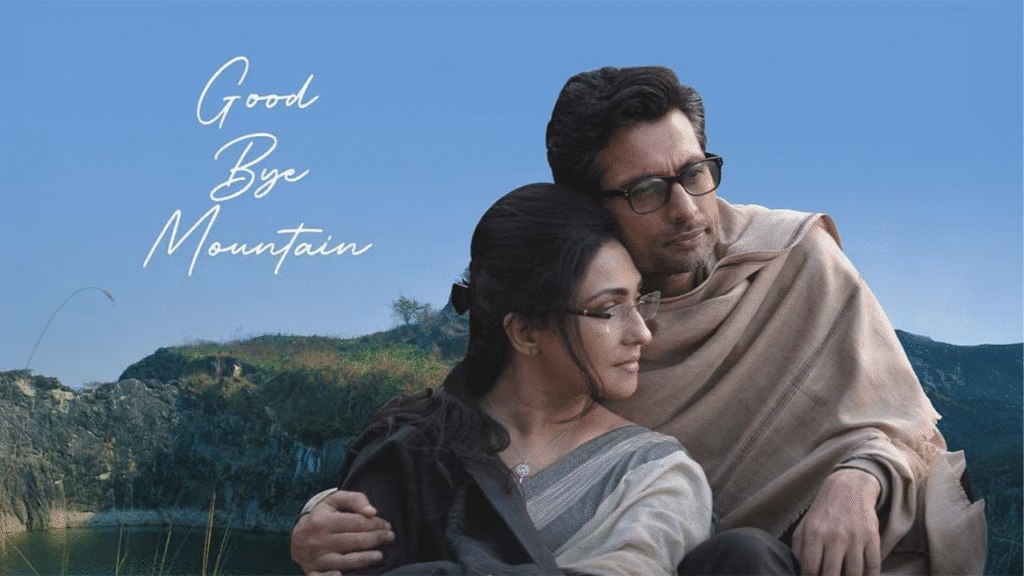Languages: Bengali
Genre: Drama, Romance, Psychological
Age Rating: U/A
Director Indrasis Acharya returns with Goodbye Mountain, a visually meditative and emotionally textured Bengali drama that traverses love, loss, and the lingering impact of unresolved emotions. Known for his subtle and cerebral storytelling in films like Pupa, Bilu Rakkhosh, and Parcel, Acharya once again crafts a world of emotional depth and narrative introspection. This time, it’s nestled high in the misty hills of Wayanad.
Plot: A Reunion Clouded by the Past
Set against the stunning natural canvas of Kerala’s mountains, the story centers around two former lovers—Arjun and Anandi—who reunite after years of separation. Their attempt to reclaim lost time in a remote hillside bungalow soon stirs up ghosts of the past. As the calm surface of their reunion begins to crack, new complications arrive—most notably with the unexpected arrival of Anandi’s husband, Rathijit.
The film unfolds in layers rather than linear beats. It avoids spoon-feeding the audience, instead offering a meditative rhythm that mirrors the uncertain emotional ground its characters traverse. From hidden glances to silences filled with meaning, every moment is a window into unspoken truths.
Performances: Everyone Delivers with Grace
Rituparna Sengupta shines luminously as Anandi, portraying a woman torn between longing and loyalty. Her portrayal is graceful and controlled, capturing the many shades of emotional vulnerability. Indraneil Sengupta matches her beat for beat as Arjun—his brooding restraint and internal conflict bring a compelling realism to the role. The chemistry between them is nuanced and palpable, rooted in familiarity and pain.
Anirban Bhattacharjee, as Rathijit, is quietly intense—he doesn’t need to raise his voice to command the scene. His presence adds weight and subtle tension, particularly in scenes that challenge emotional loyalty.
Even in limited screen time, Ananya Sengupta, who plays a local doctor, leaves a lasting impression. Her calm strength and introspective warmth provide a much-needed balance to the charged emotional palette of the film.
Though a secondary subplot involving local teenagers doesn’t quite resonate on the same level, it serves as a reflective device, subtly mirroring the core themes of disconnection and rediscovery.
Direction & Cinematic Brilliance
Indrasis Acharya’s direction is purposeful and poetic. He allows the story to breathe, trusting his actors and the setting to carry the emotional weight. There are no dramatic monologues or forced confrontations—just people trying, failing, and hoping to reconnect.
Santanu De’s cinematography is nothing short of breathtaking. Each frame is soaked in mood—soft sunlight breaking through mist, shadowy forests, and rain-slicked pathways—all echoing the characters’ emotional turmoil.
Ranajoy Bhattacharjee’s music deserves a special mention. Tracks like Kaala Modhu and Uttor Saaji do more than underscore scenes—they elevate them. The soundtrack complements the film’s meditative pace and emotional undercurrents, never overwhelming but always present.
Why Goodbye Mountain Deserves Your Time
✅ Thought-provoking exploration of love, memory, and healing
✅ Rich, layered performances from a stellar cast
✅ Soulful music and standout cinematography
✅ Masterful direction that values subtlety over spectacle
✅ An emotionally satisfying experience that stays with you
Final Verdict: ⭐⭐⭐⭐½ (4.5/5 Stars)
Goodbye Mountain is a hauntingly beautiful film that doesn’t shout to be heard. It whispers truths about relationships, forgiveness, and the pain of unfinished stories. If you enjoy cinema that respects your intelligence and touches your heart, this mountain is worth climbing.
Latest Movie Reviews
- Sarzameen Movie Review: A Stirring Emotional Thriller with Standout Performances
- Saiyaara Movie Review: A Soul-Stirring Debut That Strikes the Right Chords
- Sarbala Ji Movie Review: A Delightful, Power-Packed Punjabi Wedding Comedy
- So Long Valley Movie Review: A Chillingly Beautiful Thriller That Delivers a Gripping Payoff
- Maareesan Movie Review: A Gripping and Rewarding Tale of Redemption and Unlikely Kinship
- Mahavatar Narsimha Movie Review: A Spiritually Powerful and Emotionally Rich Animated Epic
- Mandala Murders Review: A Gripping, Haunting Thriller That Delivers More Than Just Chills
